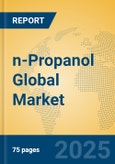The n-Propanol market is defined by its adaptability to diverse applications, reliance on petrochemical-based production (e.g., ethylene hydroformylation), and sensitivity to industrial and regulatory shifts. Emerging trends include a focus on bio-based production to reduce carbon footprints, growing adoption in pharmaceutical synthesis, and increasing penetration in Asia’s booming chemical sector.
Market Size and Growth Forecast
The global n-Propanol market was valued at USD 1.1 billion to USD 1.6 billion in 2024, with an estimated CAGR of 5.0% to 7.0% from 2025 to 2030, driven by demand for solvents and chemical intermediates.Regional Analysis
North America grows at 4.5% to 6.5%, with the United States leading due to its strong industrial base; trends focus on green solvents and pharmaceutical innovation.Europe achieves a growth rate of 5.0% to 7.0%, driven by Germany and the UK; trends emphasize eco-friendly production and regulatory adherence.
Asia Pacific sees a growth rate of 5.5% to 7.5%, with China as the primary hub; trends highlight rapid industrialization and export-driven growth.
The Rest of the World records a growth rate of 4.5% to 6.5%, with India gaining traction; trends center on agrochemical and infrastructure development.
Application Analysis
Coating expands at 5.5% to 7.5%; it utilizes n-Propanol’s solvency in paints and finishes, with trends shifting toward sustainable, low-emission products.Printing Ink grows at 5.0% to 7.0%; it relies on n-Propanol’s evaporation properties, with trends favoring eco-conscious inks for packaging.
Pharmaceutical rises at 5.5% to 7.5%; it employs n-Propanol in drug formulation, with trends focusing on high-purity standards for generics.
Agrochemical expands at 5.0% to 7.0%; it aids in pesticide synthesis, with trends emphasizing precision and safety.
Others grow at 4.5% to 6.5%; this encompasses uses in personal care and cleaners, with trends exploring niche solvent applications.
Key Market Players
Dow, based in Midland, Michigan, USA, is a chemical powerhouse, producing n-Propanol for coatings and pharmaceuticals with a global supply chain and innovative focus.BASF, headquartered in Ludwigshafen, Germany, offers n-Propanol for diverse industrial uses, prioritizing sustainability and advanced production techniques.
Eastman, from Kingsport, Tennessee, USA, specializes in chemical solutions, supplying n-Propanol for high-quality inks and coatings with tailored formulations.
Sasol, located in Johannesburg, South Africa, leverages its integrated operations to produce n-Propanol, serving international markets with consistent quality.
Solvay, based in Brussels, Belgium, focuses on specialty chemicals, providing n-Propanol for agrochemical and pharma applications with a sustainability lens.
Daicel, headquartered in Osaka, Japan, excels in chemical manufacturing, producing n-Propanol for precision applications in coatings and inks.
Dairen Chemical Corporation (DCC), from Taipei, Taiwan, is a major Asian supplier, offering n-Propanol for industrial clients with efficient production capacity.
Zibo Nalcohol Chemical, located in Zibo, Shandong, China, focuses on alcohol intermediates, supplying n-Propanol for cost-effective regional solutions.
Ningbo Juhua Chemical & Science Co. Ltd., based in Ningbo, Zhejiang, China, produces n-Propanol with substantial capacity, catering to industrial and export needs.
Luxi, from Liaocheng, Shandong, China, specializes in chemical intermediates, offering n-Propanol for broad applications with a strong domestic presence.
Nanjing Rongxin Chemical, headquartered in Nanjing, Jiangsu, China, provides n-Propanol for local industries, emphasizing affordability and reliable supply.
Porter’s Five Forces Analysis
- The threat of new entrants is moderate; significant investment and compliance requirements limit entry, but market growth attracts potential competitors.
- The threat of substitutes is moderate; ethanol and other alcohols vie for solvent roles, though n-Propanol’s unique profile sustains demand.
- Buyer power is moderate; quality and availability drive purchasing, with large industrial buyers exerting pricing pressure.
- Supplier power is moderate; petrochemical raw materials link producers to fluctuating supply chains, giving suppliers some influence.
- Competitive rivalry is high; firms differentiate through capacity expansion, cost leadership, and environmental innovations.
Market Opportunities and Challenges
Opportunities
- Growing n-propyl acetate demand in coatings and adhesives fuels market expansion.
- Pharmaceutical growth in generics and agrochemical advancements boost usage.
- Bio-based production trends align with sustainability goals, enhancing market appeal.
Challenges
- Raw material price volatility affects cost stability and margins.
- Regulatory pressures on emissions and safety increase operational costs.
- Substitute solvents pose a competitive threat in price-sensitive markets.
Growth Trend Analysis
The n-Propanol market exhibits a strong growth outlook, supported by production capacity and consumption data. Ningbo Juhua Chemical & Science Co. Ltd. maintains a 100,000-ton-per-year facility, while Luxi operates at 80,000 tons annually, ensuring steady supply. Handsome Chemical’s construction of a 100,000-ton-per-year plant reflects ongoing investment. In China, production rose from 109,300 tons in 2019 to 174,100 tons in 2023, with 2023 consumption at 193,500 tons. Approximately 65% of n-Propanol demand supports n-propyl acetate production, requiring 0.618 tons per ton of acetate, particularly for coatings. This trajectory supports a projected CAGR of 5.0% to 7.0% through 2030, driven by industrial demand and capacity growth.This product will be delivered within 1-3 business days.
Table of Contents
Companies Mentioned
- Dow
- BASF
- Eastman
- Sasol
- Solvay
- Daicel
- Dairen Chemical Corporation (DCC)
- Zibo Nalcohol Chemical
- Ningbo Juhua Chemical & Science Co. Ltd.
- Luxi
- Nanjing Rongxin Chemical








